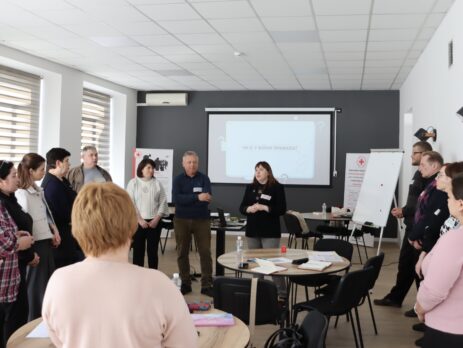Training Session on International Humanitarian Law for Teachers in the Kyiv Region
The Ukrainian Red Cross, in collaboration with the Kyiv Regional Institute of Postgraduate Education for Pedagogical Staff, organised a training session on the basics of international humanitarian law (IHL) in Bila Tserkva. The event, which took place on 11 March 2025, was attended by teachers from general secondary education institutions across the Kyiv region. The training was led by Anna Tishchenko, a volunteer trainer in international humanitarian law with the Ukrainian Red Cross.
What Teachers Learned During the IHL Training
During the training, participants learned about the main sources of international humanitarian law, which regulates the protection of victims of armed conflict and places restrictions on the methods and means of warfare. They also gained an understanding of its basic rules and principles. Teachers will be able to pass this knowledge on to their students, which is especially crucial during the ongoing full-scale war in Ukraine. In particular, the participants significantly increased their awareness of:
- The distinction between civilians and combatants, and the prohibition of attacks on civilian objects.
- The prohibition of indiscriminate attacks not directed at a specific military objective.
- The principle of proportionality, including the prohibition of attacks that are excessive in relation to the direct military advantage.
- The need to take precautions during attacks and the measures required to address the consequences of such attacks.
A significant focus was placed on the protection of civilians’ and children’s rights during the war, as well as on liability for war crimes in both Ukrainian and international courts. War crimes are serious violations of international humanitarian law, as well as the laws and customs of war, and are subject to criminal liability without a statute of limitations.
The Ukrainian Red Cross continues its vital work in spreading knowledge of international humanitarian law. This helps to build a legal culture and democratic values, particularly among the younger generation, and contributes to the restoration of justice for the victims of this brutal war.

